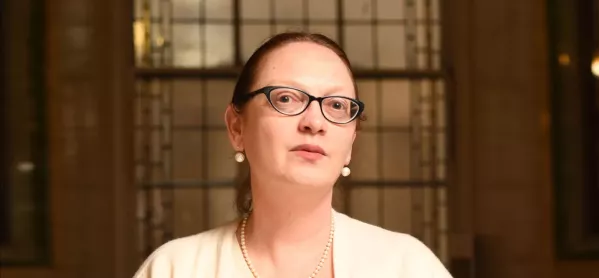Academies body CST takes legal advice over DfE strike plan

The national body representing multi-academy trusts has taken legal advice over government plans to impose minimum service levels in schools during strikes and warned that it risks putting employers in “direct conflict with staff”.
Leora Cruddas, chief executive of the Confederation of School Trusts (CST) said the organisation has sought initial legal advice on how the government plans could impact on rights as covered by Article 11 of the European Convention on Human Rights.
The move comes after the government launched a consultation earlier this week on plans to create a minimum level of service provision during strike action by teachers and school staff that would require classrooms to be kept open to certain pupils during walkouts.
More on the DfE’s strike plans:
- Heads predict DfE strike plan could end in High Court
- Revealed: DfE plan to keep three in four pupils in school during strikes
- What the government said when it launched the consultation
And it follows a warning over potential legal action from Geoff Barton, the general secretary of the Association of School and College and Leaders, last night.
Mr Barton told Tes that he expected the government plans would be tested in the High Court, and that ASCL would likely take part in that legal action.
CST has now revealed it is taking legal advice over the government’s plans.
Strike rules put trusts ‘in direct conflict with their staff’
Ms Cruddas said: “CST has sought initial legal advice on the issues related to Article 11 of the European Convention on Human Rights, which has been passed into domestic law through the Human Rights Act 1998.
“While Article 11 does not expressly refer to the ‘right to strike’, it has been interpreted as covering the taking of strike action.
“We share the House of Commons Joint Committee on Human Rights’ concerns that the proposed minimum service level raises a question not only over the ability of many individual employees to participate in a strike but over the extent to which a strike would serve any purpose, and whether less restrictive measures could achieve the same aims.
“As an organisation representing trusts as employers, we think there are both legal and ethical principles at stake here, not least of all putting employers in direct conflict with their staff.”
Concerns over breaches of international law
Earlier this week, Tes revealed that the government has drawn up lists of pupils for whom it believes there is a strong case for receiving face-to-face education during a strike.
In consultation documents published on Tuesday, the Department for Education said that, if implemented, the regulations would mean the employer - such as a school or local authority - could issue a work notice that would require individuals to work during strike action in order to deliver a minimum level of provision.
Earlier this week, the Joint Committee on Human Rights wrote to the government to express “serious concerns” about its anti-strike legislation breaching international law.
The committee said it had “concerns about the compatibility of that bill with the UK’s obligations under international law, including in particular the right to free assembly and association guaranteed by Article 11 of the European Convention on Human Rights”.
The letter to Kemi Badenoch, trade secretary and minister for women and equalities, adds: “As you will be aware, the ECHR has been made a part of domestic law through the Human Rights Act 1998.”
DfE: MSLs ‘seek to protect rights and freedoms’
In the DfE’s consultation document, it says that when setting a minimum service level, “the interference with Article 11 of the European Convention on Human Rights, which is the freedom of assembly and association, must be justified.
“We believe the MSLs are justified as they seek to protect the rights and freedoms of others, including the public.”
Ms Cruddas has previously raised concerns about the minimum service level plan and its impact on teacher recruitment.
Earlier this week, she said: “Our immediate thoughts are that there are a range of principles that must be carefully considered, including the balance between disruption to children’s education and the right to strike.
“As we have previously said, we have several concerns about this policy. In the context of a severe recruitment and retention crisis, significant challenges in the school sector and delicate industrial relations, we are concerned about the potential impact of such a policy.”
The DfE has been approached for comment.
You need a Tes subscription to read this article
Subscribe now to read this article and get other subscriber-only content:
- Unlimited access to all Tes magazine content
- Exclusive subscriber-only stories
- Award-winning email newsletters
Already a subscriber? Log in
You need a subscription to read this article
Subscribe now to read this article and get other subscriber-only content, including:
- Unlimited access to all Tes magazine content
- Exclusive subscriber-only stories
- Award-winning email newsletters
topics in this article



